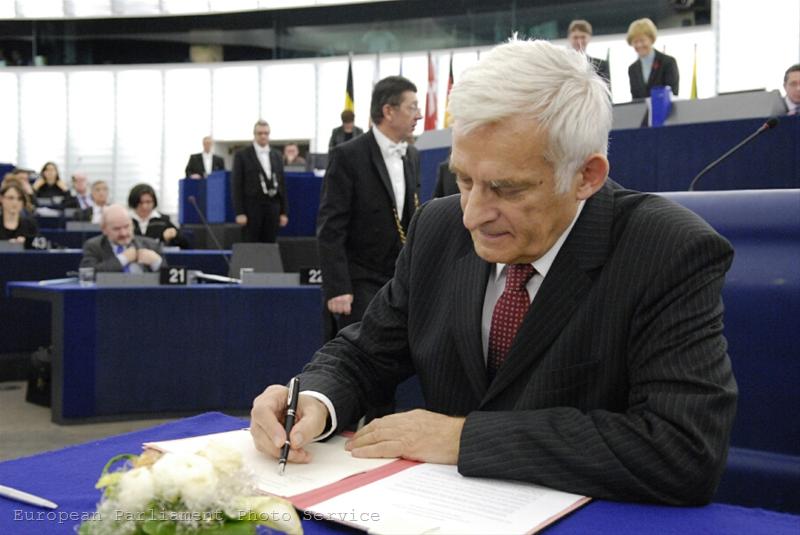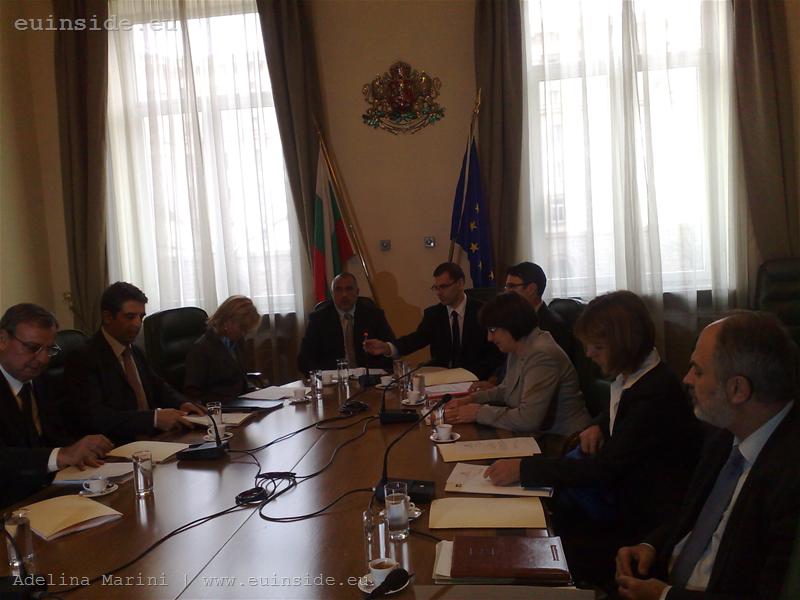New proposals for the budget
Adelina Marini, December 14, 2005
 The British EU Presidency took the hard task in July 2005 to find a compromise for the approval of the financial perspectives of the EU for the period 2007-2013. The latest proposal of the UK was commented for euinside by Janusz Lewandowski, president of the Budget and Finance committee at the European Parliament. He is a Polish MEP, from the European People's Party (EPP):
The British EU Presidency took the hard task in July 2005 to find a compromise for the approval of the financial perspectives of the EU for the period 2007-2013. The latest proposal of the UK was commented for euinside by Janusz Lewandowski, president of the Budget and Finance committee at the European Parliament. He is a Polish MEP, from the European People's Party (EPP):
The British foreign minister Jack Straw explained, after the British Presidency presented its proposal for the financial perspectives to the EU, that his basic idea was for a strict budget discipline. Besides, he warned the new member states that the money for them in the British project is much more than Western Europe had received on the "Marshall plan" after the WWII. All those ideas, together with the lack of reform of the Common Agriculture Policy (CAP), together with the significant British rebate, were met with serious criticism. Why? What is wrong with this proposal?
Janusz Lewandowski: What the UK has proposed was severely criticised by all bigger capitals in Europe and not only in our part of Europe. The main objections are that this budget, practically, defends the British interests, the rebate which is being increased from 5 bn euro per year to 7 bn euro and the bad thing is that this is going to be at the expense of the poorest EU member states, the newcomers which are now 10 but, we hope, that in 2007 Bulgaria and Romania will also join and they will also finance the British privilege - the privilege of the rich to get financed by the poor which is against EU's principles.
- True, the dispute touched the poorer countries but as far as I remember in June, during the European Council, it was the newcomers that showed surprising will their money to be diminished with the only purpose a compromise to be achieved. Whey are they protesting now?
Janusz Lewandowski: Yes, that tensed meeting in June when in the middle of the night it became clear that the British are blocking the agreement. And, yes, it is true that in those aggravated hours the Polish prime minister surprised everybody by saying that his country is ready to reject part of the money for Poland if a deal is reached. This was said more or less in the context to make our partners from the rich member states to be ashamed. Actually he didn't mean it. And they did get ashamed, in fact. This was the position of the Luxembourg Presidency, expressed by the prime minister Juncker and also by the French president Chirac. But it was not quite clear why the British partners did not get ashamed and took the statement literally as a starting point of their proposal. Our group of states had no intention, at the June summit, to reject its money.
- It looks like the British are the bad guys in the EU and we seem to be ignoring France who is also fiercely defending its position the CAP not to be reformed until 2013 and under the condition that the British rebate is gradually removed?
Janusz Lewandowski: Look, this is an alternative of a multiannual perspective. The financial perspectives have been introduced in the EU in 1988. And by then the national parliaments of the member states formed the budget of the Community annually - year for year. We can and are ready in the Parliament to form annual budgets if a deal that satisfies everyone is not reached. But this is a last resort, I'd say, because when the budget is formed on an annual basis, there is no providence, no regional policy which is so necessary for Bulgaria and Romania, Poland and many other states that need providence. So, there must be an agreement, but not at any cost. And I would like to return to the proposal of Luxembourg which was very balanced and was not at the expense of the poorer states. The British one is provocative for the newcomers and solidifies the division between old and new. We want this chapter to be closed because we are in the common European space and do not want to hear that we are new and they are old member states.
- Yes, but on the other hand there is another problem that appeared recently - that many states have experienced, and still do, difficulties in absorbing the EU funds and in the same time they claim that this money is not enough?
Janusz Lewandowski: No one is against the simplification of procedures. The fact is that the structural funds are in a terrible condition but this can change and I will give you an example: Spain, which absorbed more than 100 bn euro from the structural funds. Regretfully if we take Poland as an example, there were a lot of stupid barriers from the inside, internal regulations. We are optimistic regarding the absorption capacity because we are learning gradually. I'm confident that in the future things will normalize. The first year usually the absorption is weak. This was the case of the Iberian states, Spain and Portugal, which benefited from these funds with a delay. That is why we've established the formula n + 2 which gives an opportunity the funds to be absorbed in 3 years.
- By the way Bulgarian authorities feel comfortable with the British proposal because, according to them, it says that the budget is for Europe of the 27 and that the money for Bulgaria and Romania for the first 3 years will not change. How true is this?
Janusz Lewandowski: The paradox here is that what is written in the Accession treaties is obligatory. This means that by 2009 Bulgaria and Romania are insured with regard to the money for them as well as the Czech Republic, Poland and the rest were by 2007. Of course, your perspectives cannot be for 3 years. Your perspectives, I think, should be for a longer period because, given the level of incomes in our part of Europe, we should use the EU financing and, as could be seen now, there's a growing tension in Bulgaria and Romania regarding the question what will happen with the CAP in 2010? In other words the budget is not only numbers, it is about principles. We defend the principle of solidarity, of cohesion of opportunities, investing in the poorer regions of united Europe because everyone would benefit from this. Because when we invest, for example, in transport infrastructure, this helps tourism and everyone not only in Bulgaria and Poland.
- Some observers say that the disputes surrounding the budget gave caused deep crisis in the EU. Firstly, do you share this position and, second, do you think that there is a need of a deeper reform of the EU as a whole because, obviously, the Community cannot function with rules, that work perfectly for 15 member states and in Union of 25, and soon, I hope, of 27? And, may be, here I should mention that globalisation probably requires greater integration?
Janusz Lewandowski: My feeling is that globalisation means requirement for integration of the European continent and for a untied response to the challenges that globalisation poses. Yes. Europe is pessimistic towards its own future, but we, behind the Iron Curtain, are optimists. And, by the way, that is our obligation now - to refresh the European project which really is lovely and from which countries like Ireland or Spain benefited. So, now it's time Bulgaria and Romania to join. And even if there is a sense of a crisis, we are obliged to our future. It's true that the tension around the money is the hardest part of all problems, but it is not unusual. Let us remember the agreement of 1999 which was also agreed in the very last moment. But I would prefer that there are not many revolutionary changes in the EU because this brought so much progress to so many countries, although today we realise that the mechanism is a bit old but we shouldn't make any abrupt changes because revolutionary ideas usually provoke someone. Look how France is reacting to the demands of a reform of the CAP. The EU needs regular changes, not revolutionary ones.
- You have just touched a part of my last question, Mr. Lewandowski, do you think that those problems are directly linked to the frozen project for a European constitution or, ti put it in other words, to the common exhaustion of enlargement and integration?
Janusz Lewandowski: Unfortunately many people in France or Germany, for example, are inclined to blame enlargement for their internal hardships, although those hardships are caused by internal difficulties and problems. Those problems have nothing to do with enlargement. Enlargement is a game of the type "lose something but gain something else" because, even if they lose money by financing us, in the same time they benefit by trading with us, by their investments in our part of Europe, so there is benefit for everyone. Regretfully, this cannot be a stereotype. A lot of negative stereotypes appeared lately that enlargement is a concession and it's not. The normal thing would be things to be presented objectively, with numbers, with data, with the logic of the EU. That is why I tend to defend the very active role of the newcomers for the refreshment of the European project. We need it for our common development.
 | © European Parliament Photo Service
| © European Parliament Photo Service | © Audiovisual Service
| © Audiovisual Service | © euinside
| © euinside